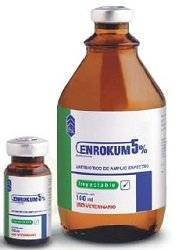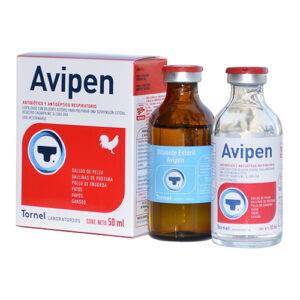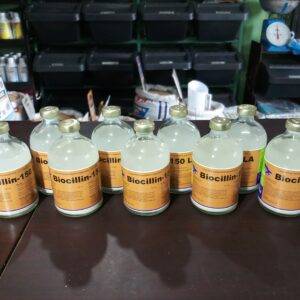Enrokum
Enrokum is a veterinary medicine containing enrofloxacin, a broad-spectrum fluoroquinolone antibiotic. It is primarily used to treat bacterial infections in various animals, including livestock and companion animals. Enrokum’s active ingredient, enrofloxacin, works by inhibiting bacterial DNA replication, effectively killing bacteria and preventing their spread.
Key Information about Enrokum:
Mechanism of Action:
Enrokum (like all enrofloxacin-based products) inhibits two bacterial enzymes, DNA gyrase and topoisomerase IV, which are essential for bacterial DNA replication, transcription, and repair. By blocking these processes, enrofloxacin causes bacterial cell death.
Indications:
Enrokum is commonly used to treat infections caused by susceptible bacteria, including:
Respiratory tract infections (e.g., pneumonia, bronchitis)
Urinary tract infections (UTIs)
Gastrointestinal infections
Skin and soft tissue infections
Septicemia (blood infections)
Reproductive tract infections
Enrokum is typically used in:
Cattle: To treat respiratory infections and other systemic bacterial diseases.
Pigs: To control respiratory infections caused by susceptible bacteria.
Poultry: For bacterial infections like colibacillosis.
Dogs and cats: For a variety of bacterial infections.
Dosage Forms:
Enrokum is available in different forms, including:
Injectable solution: Commonly used in large animals like cattle, pigs, and poultry.
Oral tablets: Available for small animals like dogs and cats.
Oral solutions: Used for easy administration in certain species.
The dosage and route of administration vary depending on the species being treated, the severity of the infection, and the animal’s weight. Always follow the veterinarian’s prescription for the correct dosage.
Dosage and Administration:
Cattle and Pigs: The injectable form is often administered intramuscularly or subcutaneously. Dosage can range from 2.5 to 5 mg/kg of body weight, depending on the condition.
Dogs and Cats: The oral tablet form can range from 5 to 10 mg/kg daily, based on the type and severity of the infection.
Poultry: Dosage is often provided in drinking water, with concentrations adjusted to treat the whole flock.
Treatment duration typically lasts from 3 to 10 days, depending on the severity and nature of the infection.
Benefits:
Broad-spectrum efficacy: Enrokum works against a wide range of Gram-positive and Gram-negative bacteria, including those resistant to other antibiotics.
Fast action: It is rapidly absorbed and distributed in the body, reaching therapeutic concentrations quickly.
Multiple forms: Enrokum is available in various forms, making it versatile for different animals and conditions.
Side Effects:
Gastrointestinal upset: Some animals may experience vomiting, diarrhea, or reduced appetite.
Cartilage damage: In young, growing animals, enrofloxacin may cause damage to cartilage, leading to joint issues. This risk is particularly noted in puppies and kittens.
Neurological effects: Rare cases of seizures, tremors, or other neurological issues may occur, particularly in animals with pre-existing neurological conditions.
Photosensitivity: Some animals may become more sensitive to sunlight after prolonged exposure.
Precautions:
Young Animals: Enrokum should not be used in puppies under 12 months (18 months for large breeds) due to the risk of cartilage damage.
Pregnant or lactating animals: Use with caution as the safety of enrofloxacin in pregnant or lactating animals has not been well established.
Animals prone to seizures: Use cautiously in animals with a history of seizures or neurological disorders.
Concomitant drug use: Avoid using Enrokum with certain other drugs (e.g., antacids) as they can interfere with absorption.
Withdrawal Times in Food-Producing Animals:
Meat: In cattle and pigs, a withdrawal period is required before animals can be slaughtered for human consumption. The specific withdrawal time varies by country but typically ranges from 5 to 28 days after the last administration of Enrokum.
Milk: For dairy cows, a withdrawal period of approximately 5 days is usually required before milk from treated cows can be used for human consumption.
Contraindications:
Allergic reactions: Animals allergic to fluoroquinolones should not be treated with Enrokum.
Juvenile animals: Due to cartilage damage risks, it is contraindicated in growing puppies and kittens.
Pregnancy: Use with caution in pregnant animals unless deemed necessary by a veterinarian.
Bacterial Resistance:
Like other antibiotics, improper use of Enrokum can lead to the development of bacterial resistance. It is critical to use it only as prescribed by a veterinarian to reduce the risk of resistance.
Conclusion:
Enrokum is an effective antibiotic for treating a wide range of bacterial infections in various animal species. Its broad-spectrum activity, rapid absorption, and multiple forms make it a versatile treatment option. However, it should be used under the guidance of a veterinarian, particularly in young, pregnant, or seizure-prone animals, to avoid potential side effects and resistance development.





Reviews
There are no reviews yet.